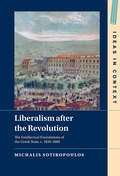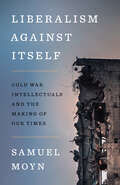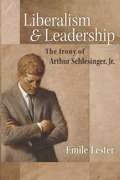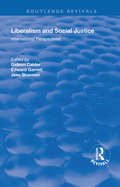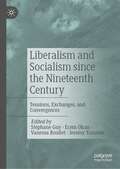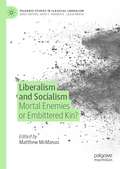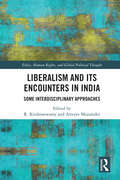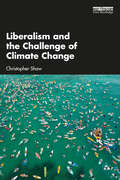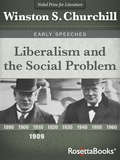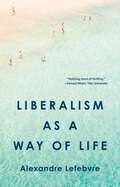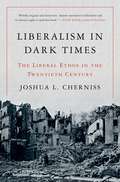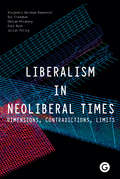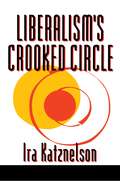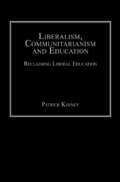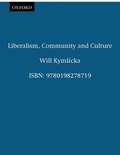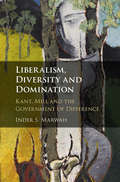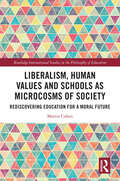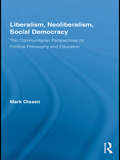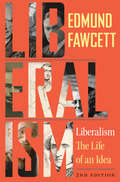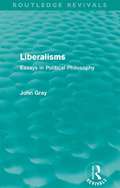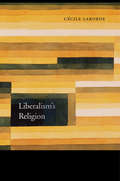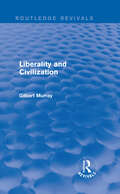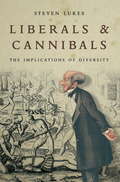- Table View
- List View
Liberalism after the Revolution: The Intellectual Foundations of the Greek State, c. 1830–1880 (Ideas in Context #143)
by Michalis SotiropoulosHow is a new state built? To what ideas, concepts and practices do authorities turn to produce and legitimise its legal and political system? And what if the state emerged through revolution, and sought to obliterate the legacy of the empire which preceded it? This book addresses these questions by looking at nineteenth-century Greek liberalism and the ways in which it engaged in reforms in the Greek state after independence from the Ottomans (c. 1830-1880). Liberalism after the Revolution offers an original perspective on this dynamic period in European history, and challenges the assumptions of Western-centric histories of nineteenth-century liberalism, and its relationship with the state. Michalis Sotiropoulos shows that, in this European periphery, liberals did not just transform liberalism into a practical mode of statecraft, they preserved liberalism's radical edge at a time when it was losing its appeal elsewhere in Europe.
Liberalism against Itself: Cold War Intellectuals and the Making of Our Times
by Samuel MoynThe Cold War roots of liberalism&’s present crisis &“[A] daring new book.&”—Becca Rothfeld, Washington Post By the middle of the twentieth century, many liberals looked glumly at the world modernity had brought about, with its devastating wars, rising totalitarianism, and permanent nuclear terror. They concluded that, far from offering a solution to these problems, the ideals of the Enlightenment, including emancipation and equality, had instead created them. The historian of political thought Samuel Moyn argues that the liberal intellectuals of the Cold War era—among them Isaiah Berlin, Gertrude Himmelfarb, Karl Popper, Judith Shklar, and Lionel Trilling—transformed liberalism but left a disastrous legacy for our time. In his iconoclastic style, Moyn outlines how Cold War liberals redefined the ideals of their movement and renounced the moral core of the Enlightenment for a more dangerous philosophy: preserving individual liberty at all costs. In denouncing this stance, as well as the recent nostalgia for Cold War liberalism as a means to counter illiberal values, Moyn presents a timely call for a new emancipatory and egalitarian liberal philosophy—a path to undoing the damage of the Cold War and to ensuring the survival of liberalism.
Liberalism and Leadership: The Irony of Arthur Schlesinger, Jr.
by Emile LesterMost scholars and pundits today view Franklin Delano Roosevelt and John F. Kennedy as aggressive liberal leaders, while viewing Schlesinger’s famous histories of their presidencies as celebrations of their steadfast progressive leadership. A more careful reading of Schlesinger’s work demonstrates that he preferred an ironic political outlook emphasizing the virtues of restraint, patience, and discipline. For Schlesinger, Roosevelt and Kennedy were liberal heroes and models as much because they respected the constraints on their power and ideals as because they tested traditional institutions and redefined the boundaries of presidential power. Aggressive liberalism involves the use of inspirational rhetoric and cunning political tactics to expand civil liberties and insure economic equality. Schlesinger’s emphasis on the crucial role that irony has played and should play in liberalism poses a challenge to the aggressive liberalism advocated by liberal activists, political thinkers, and pundits. That his counsel was grounded in conservative insights as well as liberal values makes it accessible to leaders across the political spectrum.
Liberalism and Social Justice: International Perspectives (Avebury Ser. In Philosophy Ser.)
by Gideon Calder Edward GarrettThis title was first published in 2000: Bringing oes liberalism have either the theoretical capacity or the political durability to provide for social justice, particularly given the challenges of the new millennium? From a diverse array of disciplinary, cultural and critical perspectives, the contributors to this timely and incisive collection of essays cover ground ranging from the philosophical adequacy of liberalism’s central tenets, to the treatment of minority and alternative cultures in contemporary Europe, to the future of welfare provision, to the continued tenability of traditional ideological distinctions and labels amid the social conditions and demands of the new millennium. The book will be of particular interest to philosophers, political scientists and social and legal theorists - and to anyone with a general interest in the present and future horizons of social justice in theory and practice.
Liberalism and Socialism since the Nineteenth Century: Tensions, Exchanges, and Convergences
by Vanessa Boullet Stéphane Guy Ecem Okan Jeremy TranmerThis book aims to re-evaluate the relations between two major ideologies that have been increasingly contested in recent years, yet continue to be invoked or rejected as foundational systems for political thought or action. With socialism conceiving of itself as an alternative to economic liberalism, the two systems of thought emerged partially in opposition to each other. However, this book seeks to redefine their specificities and the way in which they have not only opposed each other but drew on common notions or paradigms to become both competing and complementary systems of thought and practices. With contributions from eminent political scientists and historians of political and economic thought, the book examines how the polarisation of debates and politicisation of concepts such as property, freedom, the individual, or the State, serve to construct the adversary and form a basis for political commitment. Offering an interdisciplinary assessment of the relation between liberalism and socialism, the authors help to make sense of current debate on individual freedom, political obligation and the changing role of the State. Providing an innovative perspective, this edited collection will be of interest to scholars and students researching political and economic thought, history or science, as well as anyone seeking to understand current developments affecting Western societies, and their past, present, and future ideologies.
Liberalism and Socialism: Mortal Enemies or Embittered Kin? (Palgrave Studies in Classical Liberalism)
by Matthew McManusIn times of pandemic and global economic crisis, little more than a decade after the last, there are serious questions about how the liberal order can stand, who its friends are, and what the future will look like. This edited collection provides a comprehensive overview of the principles and stakes at play in the dispute between liberalism and socialism. It explores the 21st century appeal of socialism, particularly to millennials and other relatively young citizens, and shows why modern classical liberalism and neoliberalism have generated tepid support, leading to the resurgence of socialism after it was thought dead and buried due to the dramatic failures of statist models in 1989. The authors put modern socialism and liberalism into renewed dialogue with another to examine whether the two can coexist peacefully, or even reach an overlapping consensus on social reform going forward. It delves into the history and theory of both liberalism and socialism to determine points of overlap and tension, in addition to a cross-disciplinary interpretive analysis of the present epoch to determine how both traditions have evolved since the 20th century. The book is interdisciplinary and provides a broad array of perspectives including a diversity of ideological perspectives ranging from committed Marxists to libertarians. It will be of interest to academics and students in economics and contemporary political culture.
Liberalism and its Encounters in India: Some Interdisciplinary Approaches (Ethics, Human Rights and Global Political Thought)
by Atreyee Majumder R. KrishnaswamyThis book explores the future of liberalism in India. It moves away from traditional approaches and draws upon resources from other disciplines – those subjects which some might think don’t strictly fall under political science or theory – like anthropology, literature, philosophy — to critically engage with the condition of late capitalist modernity in India. The essays in the volume trace liberalism's journey through modern Indian history to give us a new standpoint to understand current debates and also point to some internal contradictions of Indian liberalism. The volume will be of importance to scholars and researchers of political science, especially political theory, and South Asian studies.
Liberalism and the Challenge of Climate Change
by Christopher ShawIn this book Christopher Shaw analyses how liberalism has shaped our understanding of climate change and how liberalism is legitimated in the face of a crisis for which liberalism has no answers. The language and symbolism we use to make sense of climate change arose in the post-World War II liberal institutions of the West. This language and symbolism, in neutralising the philosophical and ideological challenge climate change poses to the legitimacy of free market liberalism, has also closed off the possibility of imagining a different kind of future for humanity. The book is structured around a repurposing of the ‘guardrail’ concept, commonly used in climate science narratives to communicate the boundary between safe and dangerous climate change. Five discursive ‘guardrails’ are identified, which define a boundary between safe and dangerous ideas about how to respond to climate change. The theoretical treatment of these issues is complemented with data from interviews with opinion-formers, decision-makers and campaigners, exploring what models of human nature and political possibilities guide their approach to the politics of climate change governance. This book will be of great interest to students and scholars of climate change, liberal politics, environmental communication and environmental politics and philosophy, in general.
Liberalism and the Challenge of Climate Change
by Christopher ShawIn this book Christopher Shaw analyses how liberalism has shaped our understanding of climate change and how liberalism is legitimated in the face of a crisis for which liberalism has no answers.The language and symbolism we use to make sense of climate change arose in the post-World War II liberal institutions of the West. This language and symbolism, in neutralising the philosophical and ideological challenge climate change poses to the legitimacy of free market liberalism, has also closed off the possibility of imagining a different kind of future for humanity. The book is structured around a repurposing of the ‘guardrail’ concept, commonly used in climate science narratives to communicate the boundary between safe and dangerous climate change. Five discursive ‘guardrails’ are identified, which define a boundary between safe and dangerous ideas about how to respond to climate change. The theoretical treatment of these issues is complemented with data from interviews with opinion-formers, decision-makers and campaigners, exploring what models of human nature and political possibilities guide their approach to the politics of climate change governance.This book will be of great interest to students and scholars of climate change, liberal politics, environmental communication and environmental politics and philosophy, in general.
Liberalism and the Moral Life
by Nancy L. RosenblumLiberalism and the Moral Life presents the thoughts of 12 prominent scholars who are re-drawing the map of liberalism. In essays that go beyond the usual defence of liberalism based on moral scepticism or the possibility of discovering neutral principles, these writers consider possibilities for reinventing liberal thought.
Liberalism and the Social Problem: A Collection Of Early Speeches As A Member Of Parliament (Winston S. Churchill Early Speeches)
by Winston S. ChurchillThis collection of speeches from 1906 to 1909 documents Churchill&’s early years as a Member of the Liberal Party in the House of Commons. Sir Winston Churchill is admired as a brilliant Conservative politician and statesman—but he wasn't always a Conservative. In 1904, he crossed over to join the Liberal party, becoming Under-Secretary of State for the Colonies and later joining the Liberal Cabinet. This collection of his speeches reveals Churchill's dramatic shift toward a more progressive governing philosophy. Here, the young MP&’s fervently argues his positions on some of the most important issues of the time, including the "People's Budget," a highly controversial new wealth distribution initiative. The resulting conflict between the House of Lords and the House of Commons led to the passage of the Parliament Act of 1911, asserting the House of Commons' legislative powers. This compilation of speeches is both an enlightening historical document and a fascinating display of the future Prime Minister&’s political insights and oratory skill.
Liberalism as a Way of Life
by Alexandre LefebvreWhy liberalism is all you need to lead a good, fun, worthy, and rewarding life—and how you can become a better and happier person by taking your liberal beliefs more seriouslyWhere do you get your values and sensibilities from? If you grew up in a Western democracy, the answer is probably liberalism. Conservatives are right about one thing: liberalism is the ideology of our times, as omnipresent as religion once was. Yet, as Alexandre Lefebvre argues in Liberalism as a Way of Life, many of us are liberal without fully realizing it—or grasping what it means. Misled into thinking that liberalism is confined to politics, we fail to recognize that it&’s the water we swim in, saturating every area of public and private life, shaping our psychological and spiritual outlooks, and influencing our moral and aesthetic values—our sense of what is right, wrong, good, bad, funny, worthwhile, and more. This eye-opening book shows how so many of us are liberal to the core, why liberalism provides the basis for a good life, and how we can make our lives better and happier by becoming more aware of, and more committed to, the beliefs we already hold.A lively, engaging, and uplifting guide to living well, the liberal way, Liberalism as a Way of Life is filled with examples from television, movies, stand-up comedy, and social media—from Parks and Recreation and The Good Place to the Borat movies and Hannah Gadsby. Along the way, you&’ll also learn about seventeen benefits of being a liberal—including generosity, humor, cheer, gratitude, tolerance, and peace of mind—and practical exercises to increase these rewards.You&’re probably already waist-deep in the waters of liberalism. Liberalism as a Way of Life invites you to dive in.
Liberalism in Dark Times: The Liberal Ethos in the Twentieth Century
by Joshua L. ChernissA timely defense of liberalism that draws vital lessons from its greatest midcentury proponentsToday, liberalism faces threats from across the political spectrum. While right-wing populists and leftist purists righteously violate liberal norms, theorists of liberalism seem to have little to say. In Liberalism in Dark Times, Joshua Cherniss issues a rousing defense of the liberal tradition, drawing on a neglected strand of liberal thought.Assaults on liberalism—a political order characterized by limits on political power and respect for individual rights—are nothing new. Early in the twentieth century, democracy was under attack around the world, with one country after another succumbing to dictatorship. While many intellectuals dismissed liberalism as outdated, unrealistic, or unworthy, a handful of writers defended and reinvigorated the liberal ideal, including Max Weber, Raymond Aron, Albert Camus, Reinhold Niebuhr, and Isaiah Berlin—each of whom is given a compelling new assessment here.Building on the work of these thinkers, Cherniss urges us to imagine liberalism not as a set of policies but as a temperament or disposition—one marked by openness to complexity, willingness to acknowledge uncertainty, tolerance for difference, and resistance to ruthlessness. In the face of rising political fanaticism, he persuasively argues for the continuing importance of this liberal ethos.
Liberalism in Neoliberal Times: Dimensions, Contradictions, Limits (Goldsmiths Press Ser.)
by Des Freedman Kate Nash Julian Petley Gholam Khiabany Alejandro Abraham-HamanoielAn exploration of the theories, histories, practices, and contradictions of liberalism today.What does it mean to be a liberal in neoliberal times? This collection of short essays attempts to show how liberals and the wider concept of liberalism remain relevant in what many perceive to be a highly illiberal age. Liberalism in the broader sense revolves around tolerance, progress, humanitarianism, objectivity, reason, democracy, and human rights. Liberalism's emphasis on individual rights opened a theoretical pathway to neoliberalism, through private property, a classically minimal liberal state, and the efficiency of “free markets.” In practice, neoliberalism is associated less with the economic deregulation championed by its advocates than the re-regulation of the economy to protect financial capital. Liberalism in Neoliberal Times engages with the theories, histories, practices, and contradictions of liberalism, viewing it in relation to four central areas of public life: human rights, ethnicity and gender, education, and the media. The contributors explore the transformations in as well as the transformative aspects of liberalism and highlight both its liberating and limiting capacities. The book contends that liberalism—in all its forms—continues to underpin specific institutions such as the university, the free press, the courts, and, of course, parliamentary democracy. Liberal ideas are regularly mobilized in areas such as counterterrorism, minority rights, privacy, and the pursuit of knowledge. This book contends that while we may not agree on much, we can certainly agree that an understanding of liberalism and its emancipatory capacity is simply too important to be left to the liberalsContributorsAlejandro Abraham-Hamanoiel, Patrick Ainley, Abdullahi An-Na'im, Michael Bailey, Haim Bresheeth, Başak Çalı, David Chandler, William Davies, Costas Douzinas, Natalie Fenton, Des Freedman, Roberto Gargarella, Priyamvada Gopal, Jonathan Hardy, John Holmwood, Ratna Kapur, Gholam Khiabany, Ray Kiely, Monika Krause, Deepa Kumar, Arun Kundnani, Colin Leys, Howard Littler, Kathleen Lynch, Robert W. McChesney, Nivedita Menon, Toby Miller, Kate Nash, Joan Pedro-Carañana, Julian Petley, Anne Phillips, Jonathan Rosenhead, Annabelle Sreberny, John Steel, Michael Wayne, Milly Williamson
Liberalism's Crooked Circle: Letters to Adam Michnik
by Ira KatznelsonThis book is a profoundly moving and analytically incisive attempt to shift the terms of discussion in American politics. It speaks to the intellectual and political weaknesses within the liberal tradition that have put the United States at the mercy of libertarian, authoritarian populist, nakedly racist, and traditionalist elitist versions of the right-wing; and it seeks to identify resources that can move the left away from the stunned intellectual incoherence with which it has met the death of Bolshevism. In Ira Katznelson's view, Americans are squandering a tremendous ethical and political opportunity to redefine and reorient the liberal tradition. In an opening essay and two remarkable letters addressed to Adam Michnik, who is arguably East Europe's emblematic democratic intellectual, Katznelson seeks to recover this possibility. By examining issues that once occupied Michnik's fellow dissidents in the Warsaw group known as the Crooked Circle, Katznelson brings a fresh realism to old ideals and posits a liberalism that "stares hard" at cruelty, suffering, coercion, and tyrannical abuses of state power. Like the members of Michnik's club, he recognizes that the circumference of liberalism's circle never runs smooth and that tolerance requires extremely difficult judgments. Katznelson's first letter explores how the virtues of socialism, including its moral stand on social justice, can be related to liberalism while overcoming debilitating aspects of the socialist inheritance. The second asks whether liberalism can recognize, appreciate, and manage human difference. Situated in the lineage of efforts by Richard Hofstadter, C. Wright Mills, and Lionel Trilling to "thicken" liberalism, these letters also draw on personal experience in the radical politics of the 1960s and in the dissident culture of East and Central Europe in the years immediately preceding communism's demise. Liberalism's Crooked Circle could help foster a substantive debate in the American elections of 1996 and determine the contents of that desperately needed discussion.
Liberalism, Communitarianism and Education: Reclaiming Liberal Education
by Patrick KeeneyCommunitarian thinkers have identified important deficiencies in liberal thought, in particular the limits of the account of justice given in liberal theories. This book makes transparent for the reader the implications that the liberal account of justice has for our ways of thinking about education. Citing the work of John Rawls as the principal expression of contemporary liberal thought, Keeney argues that there are certain intractable tensions between the view of the individual given in rights-based theories of justice and a certain valuable conception of education, which in the West has traditionally been termed a "liberal" or "general" education and concludes that ideals of a liberal education are only available to a political ethic which is capable of articulating a public conception of virtue and the good.
Liberalism, Community and Culture
by Will KymlickaLiberalism is often described as a theory about the proper relationship between the individual and the state, but it also contains a broader account of the relationship between the individual and society. This book presents the liberal view about the nature and value of community and culturein an unusually explicit and systematic way, and links it to more familiar liberal views on individual rights and state neutrality.
Liberalism, Diversity and Domination: Kant, Mill and the Government of Difference
by Inder S. MarwahThis study addresses the complex and often fractious relationship between liberal political theory and difference by examining how distinctive liberalisms respond to human diversity. Drawing on published and unpublished writings, private correspondence and lecture notes, the study offers comprehensive reconstructions of Immanuel Kant's and John Stuart Mill's treatment of racial, cultural, gender-based and class-based difference to understand how two leading figures reacted to pluralism, and what contemporary readers might draw from them. The book mounts a qualified defence of Millian liberalism against Kantianism's predominance in contemporary liberal political philosophy, and resists liberalism's implicit association with imperialist domination by showing different divergent responses to diversity. Here are two distinctive liberal visions of moral and political life.
Liberalism, Human Values and Schools as Microcosms of Society: Rediscovering Education for a Moral Future (Routledge International Studies in the Philosophy of Education)
by Martin CohenThis seminal volume provides an accessible overview of key ethical and philosophical debates surrounding contemporary education policy, advocating for a future in education that is primarily driven by prioritising social values.Grounded in the educational ideas of recent British liberal and philosophical thinkers, including Roger Scruton, Mary Midgley and Brenda Almond in particular, the book provides a deeper understanding of the importance of intellectual and moral freedom as it plays out in today’s schools. The book echoes Almond’s call for education to be viewed through the lens of social values and argues for a broader societal strategy to the philosophy of education than narrowly utilitarian attempts to prepare pupils for the labour market. Chapters present various debates in society that relate to liberalism, social values and utilitarianism, and ultimately encourage dialogue on the approach towards education that is necessary to create a socially adjusted, thoughtful and genuinely knowledgeable society of the future.By encouraging readers to think about the requirements of the schools of tomorrow along with their role in shaping both individual lives and society itself, this book will be of interest to scholars, postgraduate students and researchers in the fields of philosophy of education, education studies and moral and value education. Those interested in the sociology of education and citizenship studies more broadly will also benefit from the volume.
Liberalism, Neoliberalism, Social Democracy: Thin Communitarian Perspectives on Political Philosophy and Education (Routledge Studies in Social and Political Thought)
by Mark OlssenThe Credit Crunch of 2008 has exposed the fallacies of neoliberalism and its thesis of the self-regulating market, which has been ascendant in both economic theory and policy over the last 30 years. In moving beyond neoliberalism, social democratic arguments are once again coming to the fore; however, in the context of the 21st century, they will need to be theorized in relation to new global concerns. This book critically revisits the core theses of liberalism and neoliberalism that have provided philosophical support to free market economics - as enunciated in the writings of liberal political philosophers such as Friedrich von Hayek, Karl Popper and Isaiah Berlin - and seeks to expose the deficiencies of their beliefs that became hegemonic from the 1970s until the first decades of the present century. In moving beyond the formulas and mantras of liberalism, the book seeks to re-theorize social democracy and articulate a new vision of the political arrangements needed for the 21st century by reconsidering issues such as liberty, autonomy, social dependence and multiculturalism.
Liberalism: The Life of an Idea Second Edition, Second Edition
by Edmund FawcettDespite playing a decisive role in shaping the past two hundred years of American and European politics, liberalism is no longer the dominant force it once was. In this expanded and updated edition of what has become a classic history of liberalism, Edmund Fawcett traces its ideals, successes, and failures through the lives and ideas of exemplary thinkers and politicians from the early nineteenth century to today. Significant revisions--including a new conclusion--reflect recent changes affecting the world political order that many see as presenting new and very potent threats to the survival of liberal democracy as we know it. A richly detailed account of a vulnerable but critically important political creed, this book reminds us that to defend liberalism it is vital to understand its character and history.
Liberalisms: Essays in Political Philosophy (Routledge Revivals)
by John GrayLiberalisms, a work first published in 1989, provides a coherent and comprehensive analytical guide to liberal thinking over the past century and considers the dominance of liberal thought in Anglo-American political philosophy over the past 20 years. John Gray assesses the work of all the major liberal political philosophers including J. S. Mill, Herbert Spencer, Karl Popper, F. A Hayek, John Rawls and Robert Nozick, and explores their mutual connections and differences.
Liberalism’s Religion
by Cécile LabordeCécile Laborde argues that religion is more than a statement of belief or a moral code. It refers to comprehensive ways of life, theories of justice, modes of association, and vulnerable collective identities. By disaggregating these dimensions, she addresses questions about whether Western secularism and religion can be applied more universally.
Liberality and Civilization: Lectures Given At The Invitation Of The Hibbert Trustees In The Universities Of Bristol, Glasgow And Birmingham (Routledge Revivals)
by Gilbert MurrayFirst published in 1938, these lectures argue that liberality is the foundation of civilization. According to Gilbert Murray, civilization provides the surplus of security, leisure and wealth that makes liberality possible; a failure of liberality is the surest test of the failure of a civilization. This is a fascinating reissue that will be of great value to students with an interest in political philosophy and the foundations of liberal society.
Liberals and Cannibals: The Implications of Diversity
by Steven LukesWith debates on the meaning of 'liberal society' more heated than ever, this is a timely re-issue of a classic textCan the tension between relativism and the moral universalism current in contemporary politics be resolved within the framework of liberalism? How is liberal society to interpret the diversity of morals? Is pluralism the appropriate response? How does pluralism differ from the widely condemned ethnocentric relativism -'liberalism for the Liberals, cannibalism for the cannibals'?Confronting liberal thought with its own limitations, Steven Lukes' work is more relevant than ever. While recognizing the dangers of moral imperialism, Lukes argues that a relativist position based on identifying clearly distinct cultural and moral communities is incoherent. Drawing on work in anthropology and philosophy, he examines the nature of social justice, the politics of identity and human rights theory.From the Trade Paperback edition.
